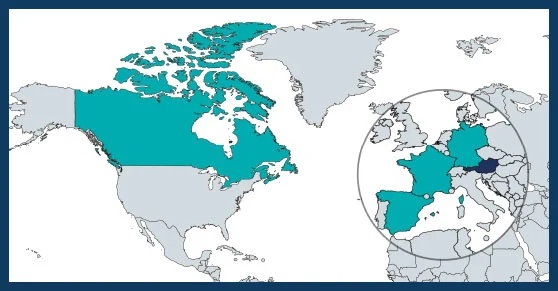03-2019 to 04-2022
€ 1,446,093
Franz Essl
franz.essl@univie.ac.at
University of Vienna, Vienna, AUSTRIA
McGill University, Montreal, CANADA
Centre National de la Recherche Scientifique/University Paris Saclay, Orsay, FRANCE
IGB & FU Berlin, Berlin, GERMANY
Senckenberg Gesellschaft für Naturforschung, Frankfurt, GERMANY
Senckenberg Gesellschaft für Naturforschung, Leipzig, GERMANY
University of Girona, Girona, Catalonia, SPAIN

Human activity has modified virtually every facets of the biophysical environment on Earth, with profound implications for the status, distribution and resilience of biodiversity. Several major drivers of biodiversity loss have been identified, with climate change, land-use change and biological invasions being among the most important ones. Changes in climate and land use have received much attention during the last decades, which resulted in readily available scenarios. In contrast, approaches also accounting for biological invasions are still lacking despite the importance of this driver for biodiversity losses and cascading impacts on human livelihoods. Worryingly, recent research has shown that numbers of alien species are rising unabatedly in most taxonomic groups. Therefore, a thorough evaluation of plausible future trajectories of biological invasions is urgently needed to enable comprehensive assessments of biodiversity changes for the decades to come, to allow better-informed decisions of policy makers and stakeholders, and to examine the future implications of different societal responses for biological invasions.
AlienScenarios will, for the first time, evaluate the range of plausible futures of biological invasions for the 21st century at different spatial scales and for a range of taxonomic groups. It will combine the strategic forward-looking methodology of scenario planning with advanced modelling approaches to construct plausible global mid-term (2050) and long-term (2100) futures of biological invasions and their impacts.
The project is divided into 7 interrelated working packages for:
1.Developing the first global scenarios for biological invasions for the 21st century;
2.Implementing global quantitative models of future alien species numbers under different biological invasion scenarios;
3. Evaluating the future impacts of biological invasions on the environment and human livelihoods under these different scenarios at a global scale;
4.Establishing continental (Europe) scenarios and models of biological invasions to assess the effectiveness of the EU regulation of invasive alien species;
5. Assessing the relationships between alien species traits and future impacts of biological invasions;
6.Expanding beyond temperate developed regions to understudied but highly biodiverse regions, and considering invasions in the context of the Global South, taking Panama as a study example;
7. Analysing the consequences of biological invasions in the 21st century under different scenarios for policy and alien species management.
In summary, in AlienScenarios we will quantitatively elucidate the plausible range of future invasion trajectories, provide crucially needed data for pro-active alien species management and policy, and explore options for arriving at preferred futures through the adaptation of existing policies.
The outcomes of the project will be disseminated through scientific publications in open-access journals and participation in international conferences, a book or a large review, a website, a Whiteboard Animation video (3 min), and a brochure and leaflets. Local stakeholders will be involved for the local socio-ecological study in Panama. Policy-makers will also be involved for assessing the effectiveness of EU regulations of invasive alien species.